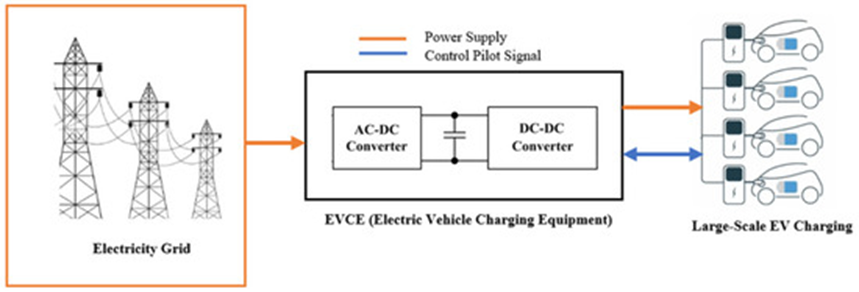Energy Management and Optimization of Large-Scale Electric Vehicle Charging on the Grid
This paper investigates the grid energy consumption by EVs and reviews recent applications of EV charging controls and optimization approaches used for the energy management of large-scale EVs charging on the grid.

Figure 1. Integration of Large-Scale EV Charging on the Grid.
The sustainability of a clean energy transition for electric vehicle transportation is clearly affected by increased energy consumption cost, which is associated with large-scale electric vehicles (EVs) charging on a fossil-fuel dependent electricity grid. This places a potential threat on the safe operations and stability of the grid and increases the emissions of greenhouse gases (GHGs) from the power stations that generate the electricity. Furthermore, the uncontrolled large-scale integration of EVs charging on the grid will increase exponentially in the coming years. Because of this, new peaks on the grid will be generated due to the EV charging load variance, and a significant impact on the transformer limit and substation capacity violation will occur. To mitigate the significant impact of the high cost of energy consumption by large-scale EVs charging on the grid, and to reduce the emissions of GHGs, there is a need to provide a multi-level optimization approach that is robust and dynamic to solve the uncontrolled charging problem of large-scale integration of EVs to the grid. This paper investigates the grid energy consumption by EVs and reviews recent applications of EV charging controls and optimization approaches used for the energy management of large-scale EVs charging on the grid. Energy management in this context is not trivial. It implies that the objectives such as load shifting, peak shaving, and minimizing the high cost of electricity consumption with a stable grid operation can be achieved. In the context of this study, EVs charging on the grid includes both battery electric vehicles (BEVs), which have larger battery banks with a longer charging duration and higher energy consumption capacity, and plug-in hybrid electric vehicles (PHEVs) which have smaller battery capacities.
Authors: Raymond O. Kene, and Thomas O. Olwal
In the same category
- A Smart Battery Management System for Electric Vehicles Using Deep Learning-Based Sensor Fault Detection
- Autel Energy Europe at AEC 2024: Pioneering the Future of Ultra-Fast EV Charging
- Baden-Württemberg International: Your partner for a successful expansion
- Business Region Goteborg : Gothenburg - Pioneering tomorrow's mobility
- Charging Electric Vehicles Today and in the Future
- Comparative Study of Permanent Magnet, Conventional, and Advanced Induction Machines for Traction Applications
- Design Methodology and Circuit Analysis of Wireless Power Transfer Systems Applied to Electric Vehicles Wireless Chargers
- Designing High-Power-Density Electric Motors for Electric Vehicles with Advanced Magnetic Materials
- Energy and Environmental National Assessment of Alternative Fuel Buses in Morocco
- Energy Management and Optimization of Large-Scale Electric Vehicle Charging on the Grid
- Fuel Cell Hybrid Electric Vehicles: A Review of Topologies and Energy Management Strategies
- Numerical Simulation of Cooling Plate Using K-Epsilon Turbulence Model to Cool Down Large-Sized Graphite/LiFePO4 Battery at High C-Rates
- Using an Intelligent Control Method for Electric Vehicle Charging in Microgrids
- Will Utrecht become the world's first bidirectional city?